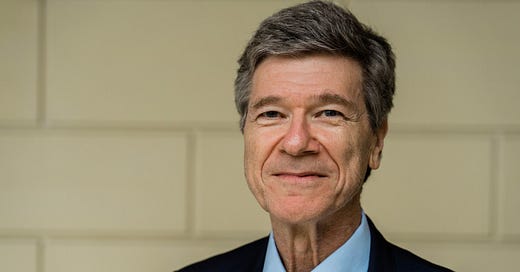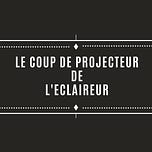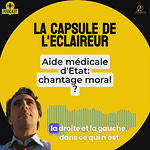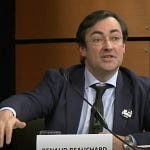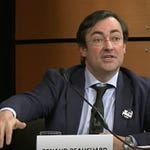Professor Jeffrey D. Sachs is a strong and dissonant voice in the midst of otherwise crafted official and media narratives. His dedication to genuine multilateralism based on the United Nations’ Charter may point at the only way out of the Ukrainian and Israeli-Palestinian utterly dangerous wars.
Prof. Sachs discusses the omnipresence of war in American foreign policy and the future of NATO and the EU. He sets out his vision of international governance and security architectures that could emerge from the Ukrainian and Israeli-Palestinian quagmires, as well as possible changes in US foreign that could result from the upcoming American presidential election.
La transcription en français de cette interview sera publiée aujourd’hui 26 octobre 2023 à 18 heures.
Jeffery D. Sachs serves as the Director of the Center for Sustainable Development at Columbia University, where he holds the rank of University Professor. Sachs was Director of the Earth Institute at Columbia University from 2002 to 2016. He is President of the UN Sustainable Development Solutions Network, Co-Chair of the Council of Engineers for the Energy Transition, academician of the Pontifical Academy of Social Sciences at the Vatican, Commissioner of the UN Broadband Commission for Development, Tan Sri Jeffrey Cheah Honorary Distinguished Professor at Sunway University, and SDG Advocate for UN Secretary General António Guterres. From 2001-18, Sachs served as Special Advisor to UN Secretaries-General Kofi Annan (2001-7), Ban Ki-moon (2008-16), and António Guterres (2017-18).
Sachs has authored and edited numerous books, including three New York Times bestsellers: The End of Poverty (2005), Common Wealth: Economics for a Crowded Planet (2008), and The Price of Civilization (2011). Other books include To Move the World: JFK’s Quest for Peace (2013), The Age of Sustainable Development (2015), Building the New American Economy: Smart, Fair & Sustainable (2017), A New Foreign Policy: Beyond American Exceptionalism (2018), The Ages of Globalization: Geography, Technology, and Institutions (2020), and most recently, Ethics in Action for Sustainable Development (2022).
Sachs is the 2022 recipient of the Tang Prize in Sustainable Development and was the co-recipient of the 2015 Blue Planet Prize, the leading global prize for environmental leadership. He was twice named among Time magazine’s 100 most influential world leaders. Sachs has received 42 honorary doctorates, and his recent awards include the 2022 Tang Prize in Sustainable Development, the Legion of Honor by decree of the President of the Republic of France, and the Order of the Cross from the President of Estonia.
Prior to joining Columbia, Sachs spent over twenty years as a professor at Harvard University, most recently as the Galen L. Stone Professor of International Trade. A native of Detroit, Michigan, Sachs received his B.A., M.A., and Ph.D. degrees at Harvard.
L'Eclaireur : Professor Sachs, may I start with a simple yet blunt question ? Why is war so engrained in US foreign policy?
Prof. Jeffrey Sachs: Well, war has been at the center of American foreign policy basically since the start of the country. Remember that after a revolutionary war, which was the so-called War of Independence of the United States, the U.S. was then 13 states on the eastern seaboard of North America. During the next 120 years, roughly, the United States fought its way across the North American continent, had wars that were under the flag of manifest destiny, that it was the destiny of the United States of America to control all of North America when North America, all but Canada and parts of Mexico remaining, had by then become part of the United States.
By the end of the 19th century, the United States began wars of imperial expansion abroad, starting with the Spanish-American War in 1898. Throughout the 20th century, the United States fought, of course, in two world wars, so did much of the rest of the world. The United States was engaged in countless other military actions around the world, especially after 1945.
When the U.S. was the dominant power in the world, it fought in many very bloody open wars, notably in Southeast Asia, the so-called Vietnam War, which was actually a war in Vietnam, Cambodia, Laos. It fought in dozens of other countries in covert operations led by the CIA or by other military units secretly - or sometimes not so secretly. After the end of the Soviet Union in December 1991, the U.S. foreign policy, rather explicitly though not so clearly understood by the public was to engage in a series of wars to topple regimes that had been allied with the Soviet Union. Hence wars in Afghanistan, in Iraq, Libya and Syria and now the war in Ukraine.
These may not seem to be all together of one piece, but they are really part of a foreign policy that is very much organized around military power and regime change as its defining characteristic.
The notion is that U.S. predominant power enables the U.S. to dictate terms and when push comes, to shove, to use that power through military means sometimes covert. It's estimated that there were 64 covert regime change operations led by the United States between 1947 and 1989 during the Cold War period.
I have been writing for many years that the United States needs a new foreign policy because this one is a danger to itself and to the world.
L'Eclaireur: So, the “ seek no monster abroad” of John Quincy Adams and the “talk softly with a big stick” of Teddy Roosevelt were never realized?
Prof. Jeffrey Sachs : (Laughter) Well, a big stick was part of Roosevelt's vision also.
L’Eclaireur : Yeah, but talk softy first…
Prof. jeffrey Sachs : Well, talk softly, but the stick was always there. He was a real imperialist. When he wanted the Panama Canal, he took it. He made his fame in the Spanish-American War, which was a war under phony pretexts in order to begin America's overseas military empire. So, you know, he was a real imperialist. Impressive in some other ways, but I'm not a great fan of his foreign policy.
L'Eclaireur: When we take a look at what's going on right now in Ukraine, which is a complete mess, and in Israel, which also seems to be a complete mess, provided that we avoid Armageddon, what kind of new or changes in the current governance and security architectures do you envision?
Prof. Jeffrey Sachs : We're in the midst of two absolutely dangerous and bloody wars because the U.S. and its allied countries or dependent countries refuse to negotiate with those they don't want to negotiate with.
The war in Ukraine essentially is a war between the United States and Russia, especially over NATO enlargement, about US military emplacements in Eastern Europe, and who about who will govern Ukraine because the U.S., participated in a violent regime change operation in February 2014. All along the United States position was “we don't have to speak to the Russians about this” so the Ukraine war is a war that reflects the rejection of diplomacy by the United States.
In my opinion - this is not a majority opinion I would say in the US or Europe - it's my understanding of this war because I know of the many opportunities that the US had to negotiate and it rejected all of them.
One of them most notably was at the end of 2021 when President Putin, in exasperation for the failures of diplomacy in the preceding decade, put on the table a draft US-Russia security agreement that was premised on the non-enlargement of NATO to Ukraine and the US official answer was we don't have to discuss that issue with you.
L'Eclaireur : How do you you explain that Europeans did not put a halt or a stop to that then?
Prof. Jeffrey Sachs : I think it's pathetic and sad because I know that many European leaders opposed the NATO expansion when it was proposed in 2008. They knew it was dangerous and they knew it was provocative, but unfortunately Brussels institutionally really fell under U.S. dominance in the past decade, to U.S. lobbyists and U.S. political pressure.
The fact that NATO and the European Union are headquartered in the same city is very mistaken in my opinion. Because the EU in a foreign policy sense is an arm of NATO, essentially. I am very disappointed that leaders of France, Germany, Italy, Spain and other majour countries did not say clearly the U.S; “what you are doing is dangerous and provocative. It endangers European interests, we don’t want you to do that.” But they never did.
I wanted them to do that repeatedly. I spoke to European leaders in many occasions but they always ended up backing down even when privately agreing. Because the United States, it was deemed, provided Europe's security in some sense, they thought or think, and therefore felt in a situation in which they could not effectively oppose or push back against US policies.
I think it's wrong and a mistake for Europe, a quite serious mistake.
L'Eclaireur : Maybe also because of corruption, but that's another story. If we come back to global governance infrastructures, especially in the current context where we've seen at the UN Security Council 14 countries voting for a ceasefire in Israel and the UN being the only country vetoing this...
Prof. Jeffrey Sachs: What's very notable about the current situation both with respect to Ukraine and with respect to the Israel-Palestine conflict is that most of the world is not on side with the so-called West.
Now, what is the West ?
The West is the United States leading with Canada, the UK, the European Union, Japan, Korea, And that's about it. I'm sorry: Australia and New Zealand, and a handful of other countries, not to insult anybody, but that's the West.And the West is, depending on who you count in and who is not in, is something like 10 to 15% of the world population.
Most of the rest of the world wants a very different approach, not an alliance approach but an approach based on the UN Charter, an approach based on a focus on sustainable development and economic and environmental challenges, not on endless wars, and certainly not on an international system with the rules written by the United States.
You know, the greatest Orwellian expression of our time is “the rule-based order”, which is the phrase the U.S uses - and the Europeans use it too. Shame on them. Shame on them !
If there's a set of rules, the rules are the UN Charter, and the international treaties, and the UN Security Council, and the UN General Assembl,y and the International Court of Justice and so forth. Those are the rules and what most of the world wants is a rule-based system. I think it's crucial.
That we get there actually, as US and Western relative power diminish, is certainly happening because the economic weight of not only China but India and the other BRICS countries, and more generally throughout the world the spread of technology, literacy, means that a US-led order is a complete anachronism.

